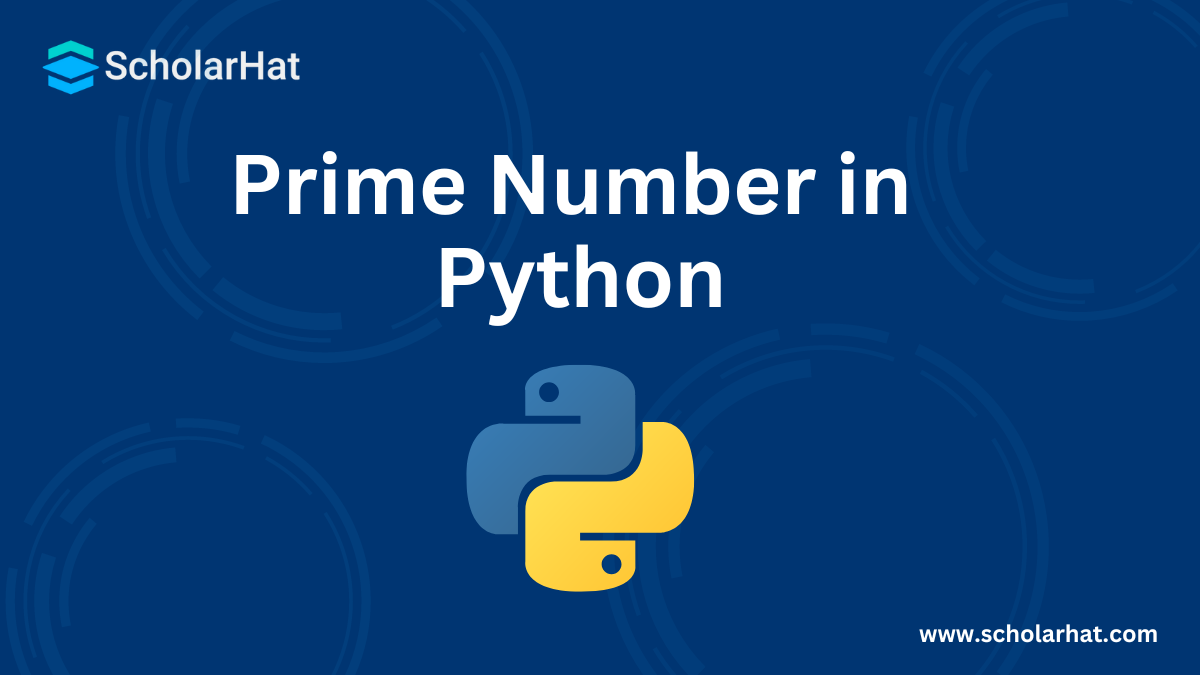25
AprPython Program to Check Prime Number
Python Program to Check Prime Number
Do you know what Prime numbers are? You must have definitely learned them in your schools. A Prime number is a number which is only divisible by 1 and the number itself. But do you know how to use Prime number in Python Programs?
In this Python Tutorial, we'll explore How to calculate Prime number in Python, we will also try checking Prime number in Python using while loop, and much more. Enroll in our Python For Data Scientists With Ai Training Program right now to learn more about different topics and concepts of Python Programming!
| Read More: Top 50 Python Interview Questions and Answers |
What is a Prime Number?
A prime number is a number that is only divisible by '1' and itself. In simpler terms, you cannot come up with a prime number by multiplying two smaller natural numbers.
We will now try to explore different ways to check a prime in Python programs.
Basic Program For Checking Prime Number in Python
If you would like to determine if a certain number is prime, you might want to create a simple Python program using Python Compiler that checks for any other divisors except one and the number itself.
def is_prime(num):
if num <= 1:
return False
for i in range(2, int(num**0.5) + 1):
if num % i == 0:
return False
return True
number = int(input("Enter a number: "))
if is_prime(number):
print(f"{number} is a prime number.")
else:
print(f"{number} is not a prime number.")
This will involve making a request for your input on a certain number before subjecting it under the mentioned test condition, which causes it to display results as follows.
Output
Enter a number: 7
7 is a prime number.How do you find the prime number from 1 to 100 in Python?
def is_prime(num):
if num <= 1:
return False
for i in range(2, int(num**0.5) + 1):
if num % i == 0:
return False
return True
primes = []
for num in range(1, 101):
if is_prime(num):
primes.append(num)
print(primes)This will show a full list of all the prime numbers present between 1 to 100.
Output
[2, 3, 5, 7, 11, 13, 17, 19, 23, 29, 31, 37, 41, 43, 47, 53, 59, 61, 67, 71, 73, 79, 83, 89, 97]Methods to Check Prime Number in Python
1. Checking Prime Numbers Using Recursion
def is_prime_recursive(num, divisor=None):
if divisor is None:
divisor = num - 1
if num <= 1:
return False
if divisor == 1:
return True
if num % divisor == 0:
return False
return is_prime_recursive(num, divisor - 1)
number = int(input("Enter a number: "))
if is_prime_recursive(number):
print(f"{number} is a prime number.")
else:
print(f"{number} is not a prime number.")Output
Enter a number: 24
24 is not a prime number.2. Finding Prime Numbers with a Flag Variable
def is_prime_with_flag(num):
if num <= 1:
return False
flag = True
for i in range(2, int(num**0.5) + 1):
if num % i == 0:
flag = False
break
return flag
number = int(input("Enter a number: "))
if is_prime_with_flag(number):
print(f"{number} is a prime number.")
else:
print(f"{number} is not a prime number.")Output
Enter a number: 6
6 is not a prime number.| Read More: Python Developer Salary |
3. Checking Prime Numbers Using sympy.isprime() method
def is_prime(num):
if num <= 1:
return False
for i in range(2, int(num**0.5) + 1):
if num % i == 0:
return False
return True
number = int(input("Enter a number: "))
if is_prime(number):
print(f"{number} is a prime number.")
else:
print(f"{number} is not a prime number.")This will also print if the number given by the user is prime or not.
Output
Enter a number: 11
11 is a prime number.4. Check the Prime Trial Division Method
def is_prime(num):
if num <= 1:
return False
for i in range(2, int(num**0.5) + 1):
if num % i == 0:
return False
return True
number = int(input("Enter a number: "))
if is_prime(number):
print(f"{number} is a prime number.")
else:
print(f"{number} is not a prime number.")Now, we can give a number and see what it does.
Output
Enter a number: 23
23 is a prime number.5. Checking Prime Numbers Using a While Loop
def is_prime_while(num):
if num <= 1:
return False
i = 2
while i <= int(num**0.5):
if num % i == 0:
return False
i += 1
return True
6. Python Program to Check Prime Number Using Math Module
import math
def is_prime_math(num):
if num <= 1:
return False
for i in range(2, math.isqrt(num) + 1):
if num % i == 0:
return False
return True
number = int(input("Enter a number: "))
if is_prime_math(number):
print(f"{number} is a prime number.")
else:
print(f"{number} is not a prime number.")Output
Enter a number: 22
22 is not a prime number.7. Python Program to Check Prime Number Using a while loop to check divisibility
def is_prime_while(num):
if num <= 1:
return False
i = 2
while i <= int(num**0.5):
if num % i == 0:
return False
i += 1
return True
# Check if a single number is prime
number = int(input("Enter a number: "))
if is_prime_while(number):
print(f"{number} is a prime number.")
else:
print(f"{number} is not a prime number.")Output
Enter a number: 17
17 is a prime number.8. Prime Number Generator Using a Generator Function
Generator functions in Python allow you to iterate through prime numbers.def prime_generator():
num = 2
while True:
if is_prime(num):
yield num
num += 1
gen = prime_generator()
for _ in range(10):
print(next(gen))| Read More: Python Career Opportunities: Is it worth learning Python in 2025? |
Prime Factorization
def prime_factors(num):
i = 2
factors = []
while i * i <= num:
if num % i:
i += 1
else:
num //= i
factors.append(i)
if num > 1:
factors.append(num)
return factors
number = int(input("Enter a number: "))
print(f"Prime factors of {number} are: {prime_factors(number)}")It will print out the prime factors of this number
Output
Enter a number: 24
Prime factors of 24 are: [2, 2, 2, 3]Sieve of Eratosthenes
def sieve_of_eratosthenes(limit):
sieve = [True] * (limit + 1)
sieve[0:2] = [False, False]
for i in range(2, int(limit**0.5) + 1):
if sieve[i]:
for j in range(i*i, limit + 1, i):
sieve[j] = False
return [i for i, is_prime in enumerate(sieve) if is_prime]
print(sieve_of_eratosthenes(100))It will print all the prime numbers up to the given limit of 100.
Output
[2, 3, 5, 7, 11, 13, 17, 19, 23, 29, 31, 37, 41, 43, 47, 53, 59, 61, 67, 71, 73, 79, 83, 89, 97]






